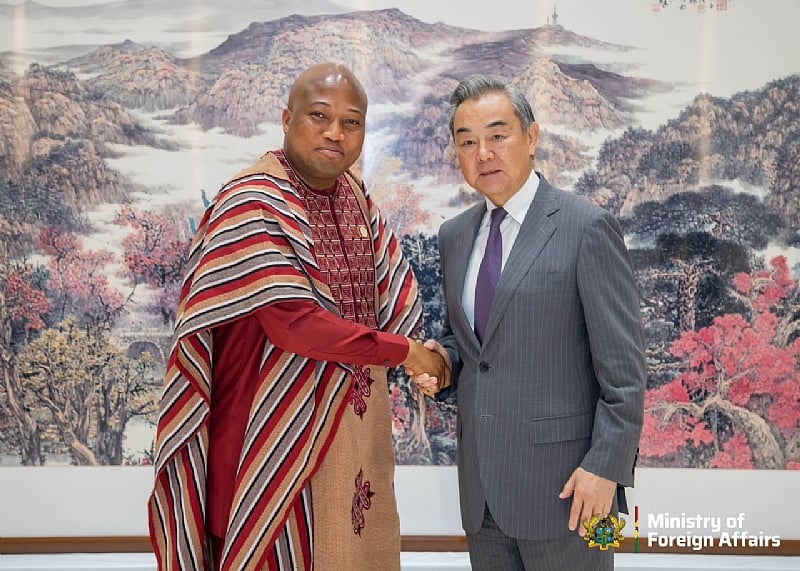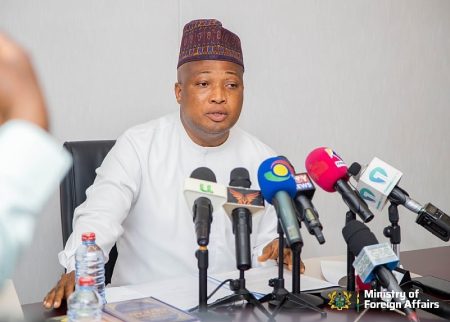Ghana and China have achieved a significant milestone in their bilateral trade relationship, marked by China’s agreement to eliminate tariffs on all Ghanaian exports. This landmark decision, announced by Ghana’s Foreign Minister, Samuel Okudzeto Ablakwa, following a high-level meeting with his Chinese counterpart, Wang Yi, signifies a deepening economic partnership between the two nations. The move is expected to significantly boost Ghana’s export sector, stimulating economic growth, creating job opportunities, and fostering entrepreneurship within the country. This zero-tariff policy, which extends to other African nations as well, underscores China’s growing engagement with the African continent and its commitment to fostering mutually beneficial economic partnerships. With bilateral trade volumes exceeding US$11 billion in 2024, China has solidified its position as Ghana’s leading trading partner.
The elimination of tariffs represents a major win for Ghana, providing its exporters with unfettered access to the vast Chinese market. This opens up significant opportunities for Ghanaian businesses to expand their reach, increase sales, and enhance their competitiveness on the global stage. Sectors such as agriculture, manufacturing, and mining are poised to benefit significantly from this tariff-free access, potentially leading to increased production, investment, and job creation within these industries. The enhanced market access facilitated by the zero-tariff regime is also expected to attract foreign direct investment into Ghana, further bolstering the country’s economic development.
Beyond the immediate benefits of tariff elimination, the discussions between the two nations also focused on strategic industrial projects aligned with Ghana’s long-term development goals. These include the development of an integrated aluminum industry leveraging Ghana’s rich bauxite reserves, powered by modern rail infrastructure. This project has the potential to transform Ghana’s mining sector, adding value to its raw materials and creating a downstream industry that generates employment and contributes significantly to the national economy. The emphasis on rail infrastructure development also highlights the importance of enhancing transportation networks to support industrial growth and facilitate trade.
Another key area of collaboration highlighted during the bilateral talks is the establishment of an electric vehicle manufacturing plant in Ghana. This initiative aims to capitalize on Ghana’s lithium resources, a critical component in the production of electric vehicle batteries. By establishing a domestic manufacturing base for electric vehicles, Ghana can position itself as a key player in the rapidly growing global electric vehicle market. This move not only diversifies Ghana’s economy but also contributes to the global transition towards sustainable transportation solutions.
The strengthened economic partnership between Ghana and China is further underscored by the forthcoming signing of a special Economic Partnership Agreement. This agreement will formalize the collaborative efforts between the two countries, providing a framework for future cooperation and solidifying their commitment to mutual economic growth. It will likely encompass various aspects of economic cooperation, including trade, investment, infrastructure development, and technology transfer. The agreement signifies a deepening of the already strong ties between Ghana and China, laying the groundwork for a long-term, mutually beneficial partnership.
The comprehensive nature of the discussions between the two nations, encompassing tariff elimination, strategic industrial projects, and the development of an electric vehicle manufacturing plant, highlights the breadth and depth of their burgeoning economic partnership. These initiatives are strategically aligned with Ghana’s development priorities, focusing on value addition to its natural resources, industrial diversification, and job creation. The partnership with China promises to significantly contribute to Ghana’s economic transformation, positioning the country for sustained growth and development in the years to come. This collaborative approach signifies a win-win scenario for both nations, fostering economic prosperity and strengthening their bilateral ties.














